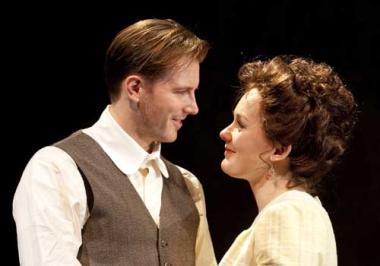Harrison, Texas, is a fictional small town that playwright Horton Foote superimposed over his real-life hometown of Wharton. Many of his plays are set in "Harrison," and he developed almost a repertory company of characters who show up in various works. All of them and more appear in The Orphans' Home Cycle, a sequence of short plays based loosely on Foote's family history and his parents' lives, in which the town is almost a character in its own right.
Foote, who died earlier this year at 92, wrote the cycle in the 1970s, spurred by memories of old family stories in the wake of his mother's death. Michael Wilson's production at Hartford Stage marks the first staging of the complete cycle, performed in three separate parts of three plays each. Seen together in chronological order, the 50-minute one-acts resemble one of those sprawling TV mini-series about a family dynasty, full of squabbles and heartache, but here focused on "ordinary" people and painted in muted tones.
The plays' constant themes are the brittleness but stubborn power of family ties; the painful inevitability of change, both personal and societal; and the longing for the warmth and safety of "home," seen here as a condition of the heart as much as a physical locale. At the center is Horace Robedaux, whose life story unfolds episodically beginning at age 12, when the death of his father and his mother's remarriage to a nasty stepfather (shades ofHamlet?) sends him out into the harsh world. The nine plays follow him through the first three decades of the 20th century, into manhood, marriage and fatherhood.
In the first play, Dylan Riley Snyder, a wonderful boy actor with a Tom Sawyer face, gives the child Horace a buoyant intensity—a trait the older Horace seems to have shed. Bill Heck's grown-up Horace is reticent to a fault, a polite young man who says, "I don't know what I'm ambitious about yet, but I sure am ambitious," yet seems to have no higher goal than to own a general store.
This diffidence may be deliberate. Horace is a hometown Everyman, hard-working but dull, a blank slate who reacts to others as often as he creates action himself. And the world of Harrison is one of modest dreams, a parochial place where everyone knows everyone and no one ever gets farther away than Houston. It's a self-contained little cosmos—Our Town with a Texas drawl—in which people's lives are quilted together in overlapping patterns. One of the charms of the piece is that in between the main storylines flow glimpses of mini-subplots as the characters gossip about other townspeople we never meet.
Each of the short plays tells a complete story that is connected to the others by recurring characters, the through-line of Horace's history and the ongoing life of the town. Of the first six plays (Part Three opens this week), five share a leisurely, lamplit feel that puts a sepia glow over the characters' loves and hates, jealousies and desires.
The exception to this mood is "Convicts," which seems to come from a different pen. Set on a plantation worked by a black chain gang, where the teenage Horace serves a miserable apprenticeship in the estate's store, this play seethes with violence and raucous humor, as well as the crippling issue of race, which is only glanced at elsewhere. It also features a larger-than-life character who would be out of place in Harrison's sedate parlors—the exuberantly drunken plantation owner, given a full-throated performance by James DeMarse.
The entire nine-play cycle contains some five dozen roles performed by a company of 22, most of them playing three or four parts. It's these rep-company turns that are most fun to watch. James DeMarse turns up again in Part Two, almost unrecognizable as the stern Methodist father of Horace's intended bride. Virginia Kull is heartbreakingly lovely in the title role of "The Widow Claire," torn between romance and responsibility to her children, and reappears two plays later as a retarded ragamuffin. Justin Fuller, an up-and-coming actor who has appeared locally at New Century Theatre and the Theater Project, pulls off four varied supporting roles, as does Devon Abner in a series of understated cameos.
Young Dylan Snyder plays another feisty kid in Part Two and is coming back as Horace's own son in the final play of the cycle. Pamela Payton-Wright plays several old ladies with a comic flair and a devastatingly sweet smile. Oddly, Hallie Foote, the playwright's daughter and most devoted interpreter, has perhaps the least range, bringing the same hunched physique and nasal twang to all her roles.
Just as the town is a living character in the plays, Jeff Cowie and David Barber's scenic design is an organic element of the production. Framed by a proscenium of quilted cloth, the plays' multiple locales appear on sliding platforms backed by plain flats onto which are projected all the interior and exterior details: wallpaper and wainscoting, clapboards and shingles, foliage and dormer windows. It's a marvelous technical feat which solves some budget problems while reflecting the cycle's image of a bygone world as ephemeral as light."
The Orphans' Home Cycle: Through Oct. 24, Hartford Stage, 50 Church St., Hartford, Conn. (860) 527-5151, www.hartfordstage.org.



